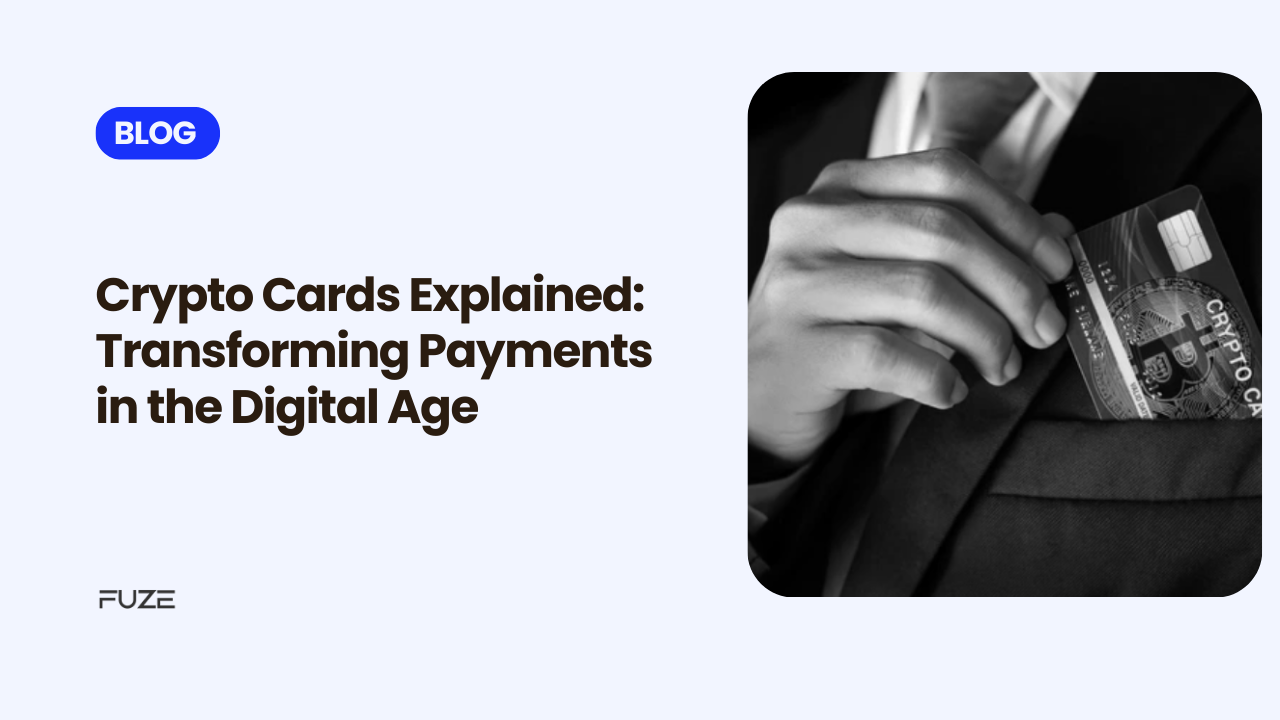In today’s digital age, the financial landscape is transforming rapidly with cryptocurrencies playing a significant role. While Bitcoin and other cryptocurrencies have gained popularity as investment assets, their role as a medium of exchange is steadily growing. Crypto cards—debit or credit cards funded by cryptocurrency—have emerged as one of the simplest, most accessible ways to use crypto for everyday purchases.
At Fuze, we are committed to enabling businesses and consumers to navigate the world of digital assets smoothly. This guide is a comprehensive look at how crypto cards work, their benefits, potential drawbacks, and how they are influencing the future of payments.
What Are Crypto Cards?
Crypto cards function similarly to traditional debit or credit cards. They are linked to a crypto wallet, enabling holders to spend cryptocurrency directly. Each time you make a transaction, the crypto card provider converts your crypto into local currency, allowing seamless purchases at millions of merchants worldwide.
Types of Crypto Cards:
- Crypto Debit Cards: Pre-loaded with cryptocurrency from the user’s wallet. Transactions directly draw funds from this balance, converting the required amount to fiat at the time of purchase.
- Crypto Credit Cards: Similar to traditional credit cards, these allow users to borrow against their crypto holdings or spend crypto with credit terms attached.
How Do Crypto Cards Work?
When a crypto card user swipes or taps their card, the following process generally occurs:
- Transaction Initiation: The user initiates a transaction by using the crypto card at a point of sale.
- Conversion: The crypto card provider converts the specified amount of cryptocurrency into fiat currency based on the prevailing exchange rate.
- Settlement: The fiat amount is settled with the merchant in the local currency, ensuring a seamless payment experience for both the buyer and seller.
Benefits of Using Crypto Cards
- Global Access and Convenience
- Crypto cards enable worldwide transactions, making them especially useful for frequent travelers and digital nomads. They eliminate the need for currency exchange and work with any merchant that accepts standard credit/debit cards.
- Enhanced Privacy
- Since many crypto cards do not require extensive personal information for usage, they provide an extra layer of privacy. Transactions are linked to the wallet rather than a personal bank account, appealing to privacy-conscious consumers.
- Reduced Transaction Fees
- International payments often come with hefty conversion fees and hidden charges. Crypto cards help reduce these costs by eliminating third-party intermediaries. Additionally, providers like Fuze work to ensure secure, low-cost processing, making it advantageous for users and businesses alike.
- Effortless Access to Crypto Holdings
- A major draw of crypto cards is that users don’t need to go through complex processes to convert and withdraw crypto. With a crypto card, assets are directly spendable in fiat form at the point of sale.
- Rewards and Cashbacks
- Many crypto card providers offer rewards, cashbacks, or even crypto incentives for transactions. This appeals to customers and makes crypto cards a competitive option compared to traditional cards.
Key Considerations and Challenges of Crypto Cards
- Volatility of Cryptocurrencies
- Cryptocurrencies are known for their price volatility. This can affect the value of funds during conversion from crypto to fiat. Some cards offer the option to lock in a stablecoin like USDT or USDC to avoid price fluctuations.
- Regulatory Landscape
- Regulations around crypto cards vary by country. While some regions embrace crypto transactions, others impose restrictions, which can limit card usage. For instance, Fuze ensures that its platform is compliant with regulatory standards, providing peace of mind for both users and businesses.
- Fees and Exchange Rates
- Although crypto cards often come with lower fees than traditional payment methods, conversion and withdrawal fees can vary depending on the card provider. Users should review these costs before committing to a card.
- Limited Acceptance
- Although crypto cards are gaining traction, acceptance may be limited in certain regions or by certain merchants. It’s essential for users to ensure the card provider has established partnerships with global networks like Visa or Mastercard.
- Security and Compliance
- Crypto cards involve holding digital assets, which may be subject to hacking risks. Trusted providers offer robust security protocols to safeguard funds. Fuze, for instance, ensures the highest levels of compliance and security with SOC2 Type II and ISO27001 certification.
How Fuze Supports Crypto Card Integration for Businesses
Fuze’s payments platform is designed to make digital asset integration effortless for businesses. Through Fuze, businesses can offer customers crypto payment options, including crypto cards. Key features of Fuze’s platform include:
- API-Based Integration: Fuze provides API-based solutions for seamless crypto payments, enabling businesses to offer crypto card transactions quickly.
- Real-Time Monitoring: With real-time transaction tracking, businesses can manage their payments efficiently and gain insights into customer trends.
- Compliance and Security: By adhering to global standards, Fuze ensures that crypto payments are secure and compliant with regulatory requirements, protecting both businesses and consumers.
For companies that want to stay ahead in the digital finance landscape, Fuze provides the tools and resources needed to incorporate crypto cards and other digital asset payment options.
Future of Crypto Cards: A Look Ahead
The rise of crypto cards marks a pivotal shift in how digital assets are used in everyday transactions. As cryptocurrency adoption grows, more merchants, institutions, and individuals are expected to embrace crypto card payments. Factors driving this growth include:
- Institutional Adoption: More large companies and institutions are recognizing the value of crypto cards, which will further legitimize and normalize their use.
- Technological Advancements: Blockchain technology is evolving to support faster transactions, reduced fees, and improved security, enhancing the functionality of crypto cards.
- Increased Regulatory Clarity: As governments around the world provide clearer guidelines for digital assets, crypto card adoption is expected to become more mainstream, with greater support and acceptance.
Fuze remains committed to supporting this evolution by offering infrastructure that simplifies crypto payment integration for businesses, helping them reach a growing segment of digital asset users.
Conclusion: Why Crypto Cards Matter for Today’s Financial Landscape
Crypto cards are more than a trend; they are a viable tool for bridging traditional finance and digital currencies. By offering lower fees, global accessibility, and privacy features, crypto cards meet the demands of modern consumers seeking efficient financial solutions.
Fuze’s platform enables businesses to harness the potential of crypto cards and other digital assets, paving the way for a more inclusive, flexible financial ecosystem. As the adoption of digital currencies grows, Fuze will continue to provide innovative solutions that empower businesses and individuals to thrive in a crypto-inclusive world.
For companies and consumers alike, the future of payments is digital—and crypto cards are at the forefront of this revolution.







